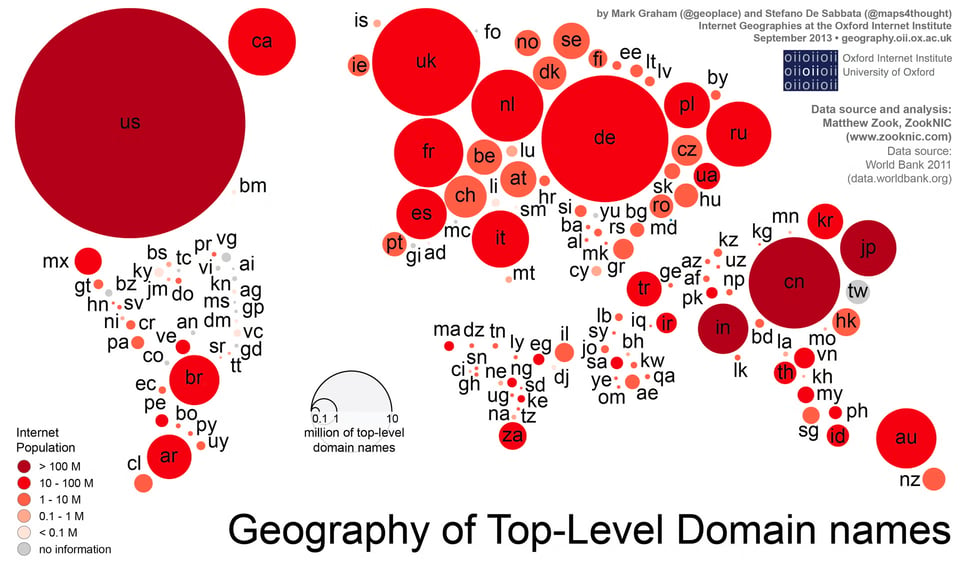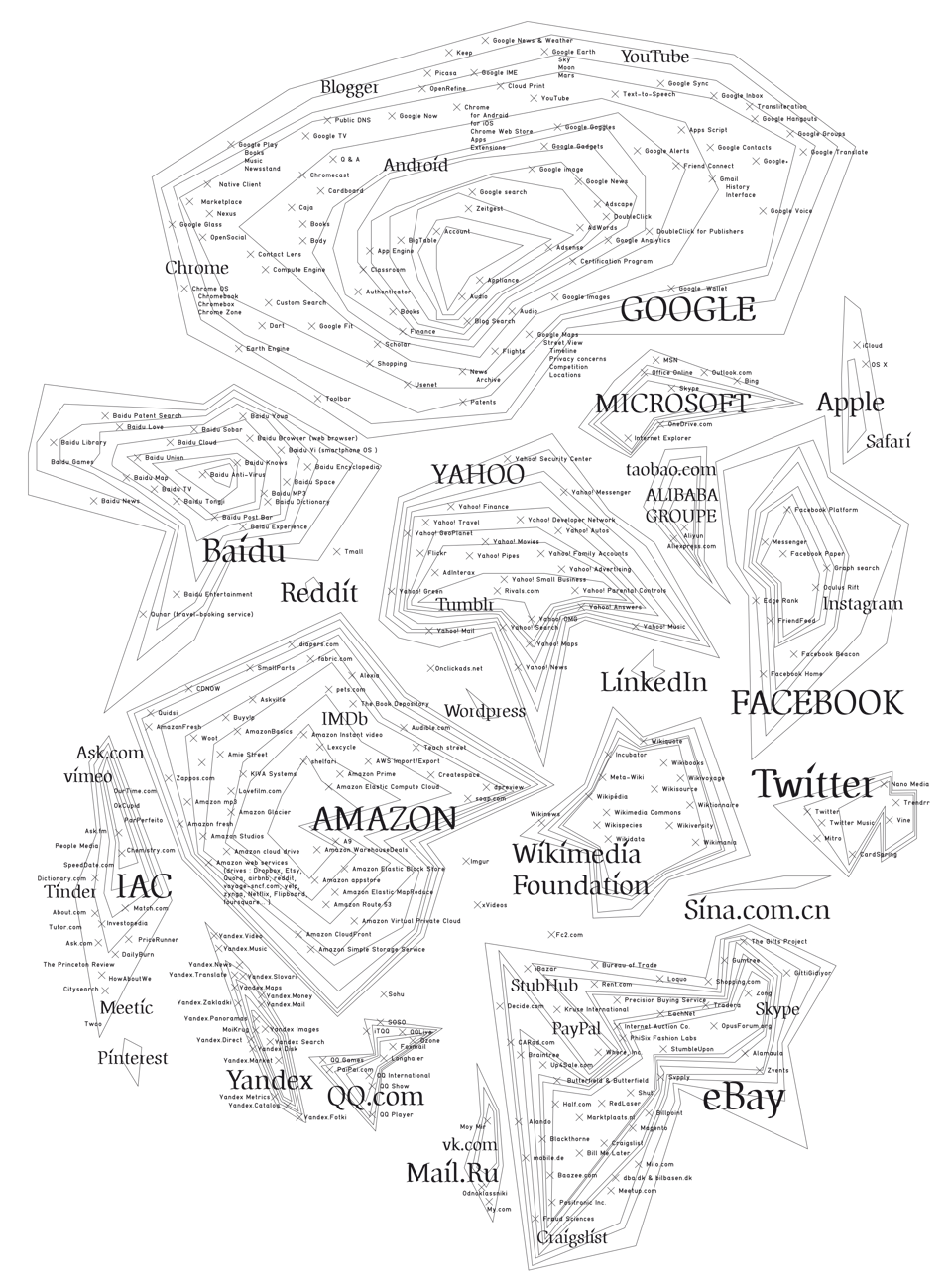d is for domain
each issue of new terms & conditions is an entry toward building abc glossary — a glossary for an anti-colonial black feminist critical media ecology. contribute your own new term & condition at abcglossary.xyz to be part of this project.
Domain naming is the social, situated, and environmental practice of "naming as placemaking" on the internet, recognizing the power in words to shape worlds materially, ideologically, and socially. 'Domaining' draws out places and borders by naming. 'Naming' makes place legitimate, legible, and accessible. Enter a name to access a site. Name it and it becomes a site. — chia amisola, domain naming
lately, my favorite party trick has been talking about top-level domains. those select few letters after the last dot in a URL extend the ongoing project of colonization but also hold potential for reparations. i’ve never given much thought to that string of text that lead me to my intended destination. as i moved through my career i noticed the distinction that came with '.edu' or '.org' as opposed to '.com'. i thought those two or three letters were just a mere matter of preference or a marker of cool if you were one of my artist friends at '.co', but recently i’ve been sitting with the geographies and economies that our digital domains create and reinforce.
a domain name is the text you type into the web browser to reach a particular website. it maps to an alphanumeric IP address, a complex numerical IP address — that looks like 192.0.2.2 for example. the more human-friendly address we type in is part of the Domain Name System (DNS), a registry of domain names. in whose domain is it?, Reboot editor tianyu fang looks into the history and political tensions involved in ccTLDs that begins in 1972 with a man named jon postel, a computer scientist at UCLA.
“…Postel’s one-man team could no longer allocate domain names for everyone on the internet. He proposed generic top-level domains (gTLDs) like .com, .org, .gov, and .mil to be managed by their respective registrars, which oversaw all registrations under its extension.” The internet becoming public also meant that it was global, so Postel and his colleague Joyce Reynolds envisioned a domain suffix for each country—a scheme that would later become known as ccTLDs.
The first ccTLD in use was .us, originally created in 1985 and administered by Postel himself. But for other countries, he appointed local managers. The establishment of ccTLDs often predated government internet authorities, so the administrators were often university labs or computer researchers. His delegation was on a first-come, first-served basis; he suggested in ARPA’s MsgGroup that the “responsible person” for second-level domains “is generally the first person that asks for the job.”

this process of domain naming is now distributed across different governing bodies, administrators, and registrars. for the person interested in generating a new domain name, the process typically looks like going to a an online marketplace to check the availability of your desired URL, and, if the price has not been significantly jacked by someone buying up potentially popular domain names, purchasing. as part of seeda school’s full stack engineering portfolio program i was prompted to think more seriously about how to present an exploration and speculative reimagining of internet infrastructure online through language. in thinking through the many ways to compile words and their meanings, like an encyclopedia or dictionary, i decided on a glossary. i was drawn to “abc” in thinking about creating a new alphabet for the internet and made it into an acronym — A Glossary for an Anti-colonial Black feminist Critical Media Ecology was born.
next i needed to secure the domain name for this project. i was excited to play up the alphabetical nature of the title. I typed a-b-c dot x-y-z to do a quick check and to my surprise discovered a webpage that belongs to Google’s parent company Alphabet Inc. this was not just any webpage but an investor relations page announcing Alphabet Inc. back in 2015. i was in utter disbelief. i had not remotely considered the ways google might have co-opted the alphabet for their capitalistic gain, which was further confirmed by the announcement letter on the site with this statement especially, “We also like that it means alpha-bet (Alpha is investment return above benchmark), which we strive for!” in this digital cartography my attempt at naming myself was running up against the Alphabet Inc. empire, one of the five biggest tech companies controlling the internet.

a domain is an area of territory owned or controlled by a ruler or government. it is the ability to give name to a place and the authority to determine the rules of that place. my realization of this is just one small part of this system that has translated to our digital realm. country-code TLDs have very literally created digital territories but not always justly. my learning of ccTLDs began with How a tiny Pacific Island became the global capital of cybercrime. an instance of an early internet entrepreneur of Amsterdam who on a "first-come, first-served basis" struck a deal to run the ccTLD (.tk) for a tiny pacific island, Tokelau. unsurprisingly, it's now a tale of abuse of power, neglect, and reputational harm to the country. their ccTLD '.tk,' as the title suggests, has for years been primarily associated with cybercrime due to the lack of regard for the scammers and cyber criminals buying up the domain in mass numbers. part of the agreement was for Tokelau to receive payments from the revenue-generated, which eventually stopped.
for colonized countries, and communities, this revenue could be a form of 'reparations' but would require a domain naming system operating towards this effort. instead ccTLDs often play into a long history of colonization and western cartographic practices. a country has to be recognized to receive a country-code independent of its colonizer, and then its use depends on a regulating body. here's a shortlist of country-codes from a Oxford Internet Institute study and their popular uses:
.tv (Tuvalu): used by the media industry
.fm (Federated States of Micronesia): used by the media industry
.am (Armenia): used by the media industry
.mu (Mauritius): used by music websites
.ac (Ascension Island): used by education-related websites
.re (Réunion): used by real-estate agents
.ws (Samoa): used as an abbreviation for “web site”
.me (Montenegro): used for personal websites
.cc (Cocos Islands): used as an alternative to .com (administered by VeriSign)
.cm (Cameroon): used as an alternative to .com (as a way of exploiting typing errors)
.nu (Niue): means “now” in Danish, Dutch, and Swedish
.as (American Samoa): the suffixes “AS” and “A/S” are used in some countries (e.g. Norway, Denmark, and the Czech Republic) for joint stock companies
.io (British Indian Ocean Territory): used by start-up companies
.st (São Tomé and Príncipe): is used around the world in several ways
.tk (Tokelau): the .tk domain can (unusually) be registered for no monetary cost. This has meant that there are over 17 million domains registered to the country (which is more than the total registered in the UK).
not on this list is the notable rise of '.ai' with the booming interest in artificial intelligence. this is a country-code that actually belongs to the caribbean island and british territory anguilla, as noted in fang's essay:
Domain sales are generating revenue for Anguilla’s government. Per Cate’s estimate, the domain registry is currently generating $3 million in revenue every month for the government, which is somewhere around a third of its monthly budget.
Anguilla isn’t the only microstate with significant government revenue from domain sales, though its relative scale is unmatched. Tuvalu, an island nation in the South Pacific, famously paid for its entry to the United Nations by selling the license for .tv to a US firm at the height of the dot-com bubble; its government made close to $5 million from ccTLD sales in 2022, or 8% of its total revenue that year. Montenegro’s revenue from the .me domain amounted to 2% of total exports in 2015, with the vast majority of the registrant coming from abroad.
interest in '.ai' also nods to the instability of this as a reparations structure when capital sways from trend to trend. country-codes TLDs should be treated as archival practice for community preservation, a taking up of (digital) space as an act of reclamation. what, or who, could cease to exist when a domain name no longer leads us there? i'm thinking more and more about how to uphold indigenous practices in our digital culture. what does indigenizing the internet look like? the possibility for reparations through ccTLDs, helps me imagine TLDs that recognize indigenous tribes, who are still not recognized as the original caretakers of this land. or, what would it look like if domain names were given to communities as a way for them to celebrate the land, the people, and use the revenue to pour back into the community? how would we then (re)value these domains? in reflecting on aiding indigenous communities setup their own community networks with the hardware, luandro's uncivilizing digital territories provides an approach that should be applied to how we think about domain naming as a practice that can be communal and liberatory:
Our approach to constructing community-first user experiences involves emphasizing the connection people have with their territory...we highlight the community’s land, its people, and cultural expressions. However, having outsiders designing user flows for a community they are not part of can compromise digital autonomy. Just as many communities have their own bakers, they should also have their own digital artisans.
i love this idea of "digital artisans." who are the digital artisans in our communities who can hold different parts of this intricate network of hardware and software? how can we celebrate the land through domain naming? domain names are one component of a website's architecture. before you decide what kind of home on the internet you want to build, ask yourself where and with whom. i have so many more layers on this topic that i want to dive more deeply into but for now, i return to luandro's words to close:
Devices and infrastructures with the goal of providing autonomy for communities must have accessibility, distribution of responsibility, and of data guardianship as priorities. Special care must be taken not to force patterns of assimilation, but rather to foster the qualities of flexibility and political creativity that were once more common in human societies. We must ask ourselves how we can recover the freedoms to move, to disobey, and to re-imagine our societies. This is essential for resisting the normalization of violence and domination.
Add a comment: